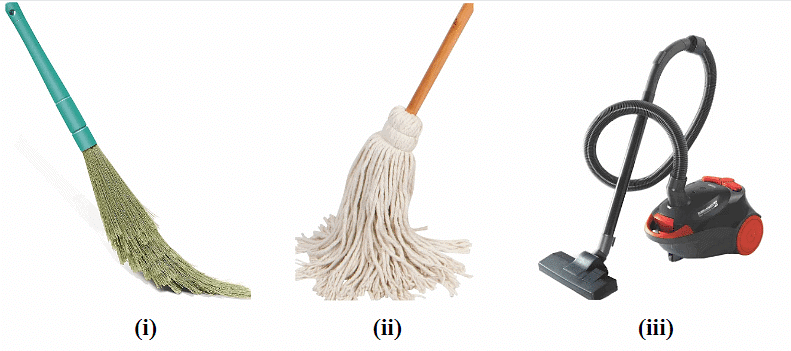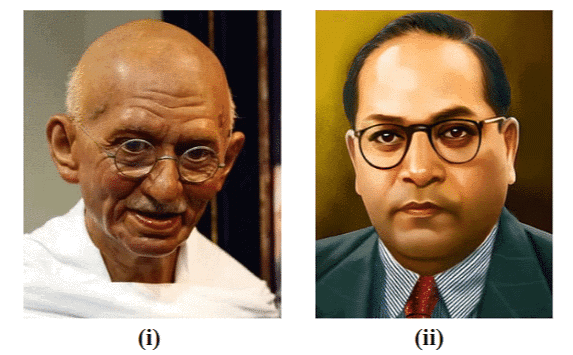Who will do this Work? Class 5 Worksheet EVS Chapter 16
Q1: Identify these cleaning materials.


Ans: (i) Broom
(ii) Mop
(iii) Vacuum Cleaner
(iv) Cleaning Brushes
(v) Dust Pan
(vi) Cleaning Liquids
Q2: Fill in the blanks
(i) Gandhiji and his team started cleaning the toilets in the village near __________ to set an example and bring social change.
Ans: Wardha
(ii) In Gandhiji’s Ashram, every person, including __________, had to participate in cleaning work.
Ans: guests
(iii) Bhim Rao Baba Saheb Ambedkar fought for justice for people like him and later led the formation of __________ after India's independence.
Ans: the Indian Constitution
(iv) In Gandhiji’s Ashram, some people refused to do the cleaning work, and some even __________ the Ashram because of this.
Ans: left
(v) The man returning from the toilet ordered Mahadevbhai to clean the dirt because he believed it was the job of __________ people and not his own responsibility.
Ans: lower-caste or untouchable
Q3:Identify the persons in the pictures and write their names in the blanks:

(i) He fought against untouchability throughout his life. He is also known as ‘Father of our nation_______________.
(ii) He fought for the justice to the people who were treated as untouchables. He was the chairman of the drafting committee of our constitution_____________.
Ans: (i) Mahatma Gandhi
(ii) Dr. Bhim Rao Ambedkar
Q4: State True or False.
(i) Gandhiji and his team started cleaning the village toilets to inspire others and bring social change.
Ans: True
Gandhiji believed in equality and dignity of labor. He and his team cleaned toilets in the village near Wardha to encourage others to break the social stigma around sanitation work.
(ii) In Gandhiji’s Ashram, only certain people were responsible for cleaning the toilets, while others were excused.
Ans: False
In Gandhiji’s Ashram, everyone, including guests, had to participate in cleaning the toilets. No one was excused, as Gandhiji wanted to break caste-based discrimination in sanitation work.
(iii) Narayan was happy when he saw villagers expecting Gandhiji’s team to clean the toilets instead of doing it themselves.
Ans: False
Narayan was upset when he saw villagers treating cleaning as someone else’s responsibility. He felt that those who made a place dirty should also clean it.
(iv) Baba Saheb Ambedkar once faced discrimination when a barber refused to cut his hair, saying that his razor would get dirty.
Ans: True
When Bhim Rao Ambedkar was a child, a barber refused to cut his hair, saying that it would make the razor dirty. This incident made him realize the deep-rooted discrimination in society.
(v) Hetal and Meena, two schoolgirls, mentioned that all children in their school shared the responsibility of cleaning.
Ans: False
Hetal and Meena explained that only children from their community were forced to clean the school toilets, while others were not required to do so. If they refused, they were beaten.
Q5: Choose the correct option.
(i) What is the name of Gandhiji's Ashram?
(a) Sabarmati
(b) Hiramati
(c) Sharda
(d) Vrindawan
Ans: Sabarmati
(ii) Write any two jobs that people would not like to do?
(a) Sweeper and labourer
(b) Engineer and doctor
(c) Teacher and Professor
Ans: Sweeper and laobourer
(iii) Gandhiji worked towards the upliftment of the lower caste and fought against
(a) Equality
(b) Christianity
(c) Judaism
(d) Untouchability
Ans: Untouchability
(iv) In which state of India is ‘Wardha' located?
(a) Gujarat
(b) Maharashtra
(c) Madhya Pradesh
(d) Uttar Pradesh
Ans: Gujarat
 |
Download the notes
Worksheet Solutions: Who Will Do This Work?
|
Download as PDF |
Q6: Short Answer Type Questions.
(i) Why do people do different kinds jobs?
Ans: Because different people have different wants, needs, and problems, skills, abilities, and resources to fulfill different wants, needs, and problems, different people have.
(ii) After India’s freedom under whose leadership was the constitution prepared?
Ans: Dr. Bhim Rao Baba Saheb Ambedkar
(iii) Who fought against untouchability throughout his life?
Ans: Dr. Bhim Rao Baba Saheb Ambedkar
(iv) “Every person should do every kind of work” Who said these words?
Ans: Mahatma Gandhi
(v) What was Mahatma Gandhi’s favourite song (Bhajan)?
Ans: Mahatma Gandhi’s favorite song was ‘Vaishnav Jan to tene kahiye’.
Q7: Long Answer Type Questions
(i) Who was Dr. Bhim Rao Baba Saheb Ambedkar? What did he become famous for?
Ans: Dr. Bhimrao Ramji Ambedkar, popularly known as Babasaheb Ambedkar, was a jurist, social reformer, and politician. He is also known as the Father of the Indian Constitution. Baba Saheb fought for justice for people like him. After India’s freedom, the Constitution was prepared under the leadership of Baba Saheb.
(ii) Who was Narayan (or) Narayan Bhai Desai?
Ans: Narayan Desai was an Indian Gandhian and author. He was the son of Mahatma Gandhi's personal secretary and biographer Mahadev Desai. He was born in Bulsar (now Valsad), Gujarat.
(iii) Why did Gandihiji and his team start doing the job of cleaning. What do you think about this?
Ans: Gandhiji and his team, started doing the job of cleaning because they wanted to preach that cleaning is everyone’s job and eradicate untouchability from society of that time.
(iv) How did the man who was returning from the toilet behave with Mahadevbhai? Why did he behave like this?
Ans: The man who was returning from the toilet, pointed to Mahadevbhai and said, “There is a lot of dirt over there. Go and clean that.”
He behaved like this because he saw Mahadevbhai cleaning the toilet and considered him a cleaning personnel.
|
38 videos|242 docs|41 tests
|
FAQs on Who will do this Work? Class 5 Worksheet EVS Chapter 16
| 1. Who is responsible for completing the tasks outlined in the worksheet? |  |
| 2. How can I ensure that the work is divided fairly among team members? |  |
| 3. What steps should I take if someone is not completing their assigned work? |  |
| 4. How can I motivate my team to engage with the worksheet tasks? |  |
| 5. What tools can assist in tracking the progress of the worksheet tasks? |  |























